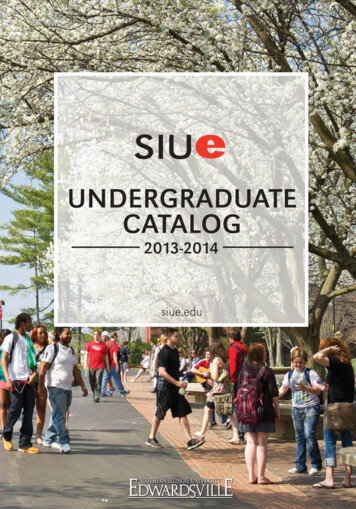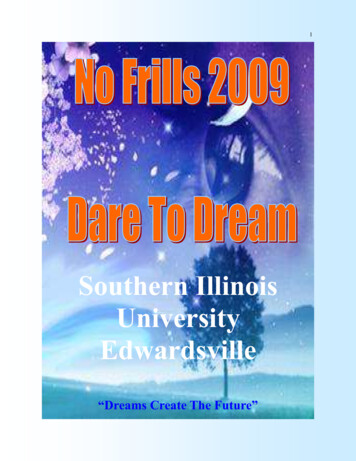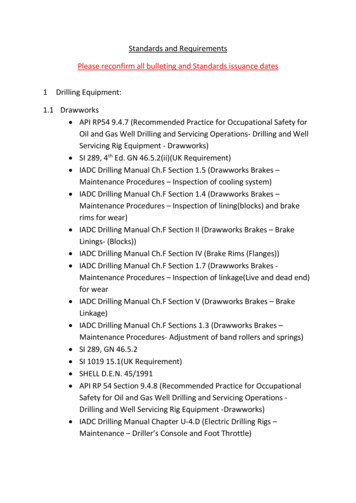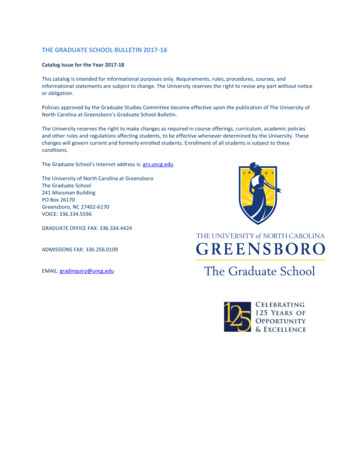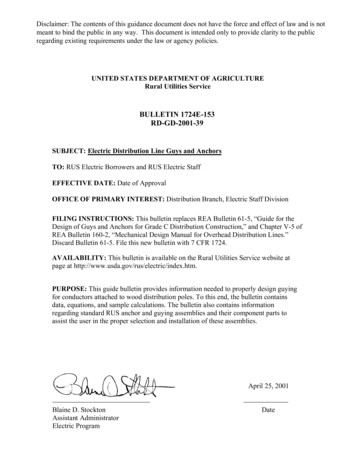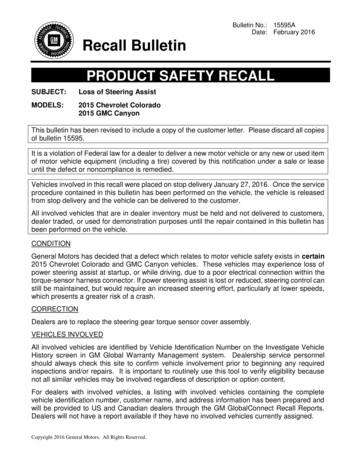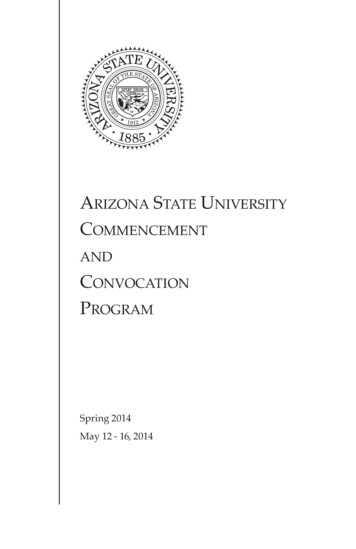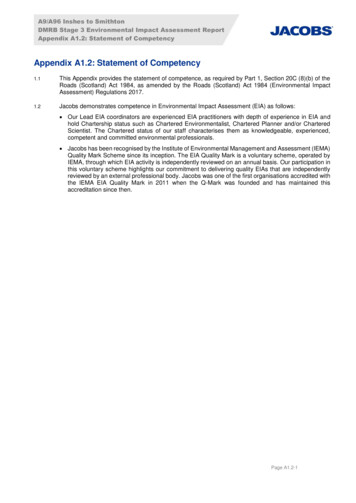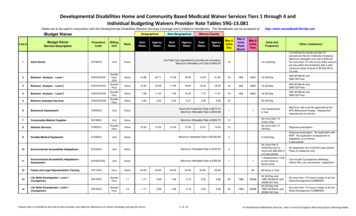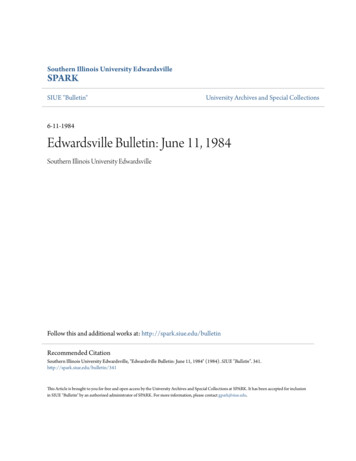
Transcription
Southern Illinois University EdwardsvilleSPARKSIUE "Bulletin"University Archives and Special Collections6-11-1984Edwardsville Bulletin: June 11, 1984Southern Illinois University EdwardsvilleFollow this and additional works at: http://spark.siue.edu/bulletinRecommended CitationSouthern Illinois University Edwardsville, "Edwardsville Bulletin: June 11, 1984" (1984). SIUE "Bulletin". 341.http://spark.siue.edu/bulletin/341This Article is brought to you for free and open access by the University Archives and Special Collections at SPARK. It has been accepted for inclusionin SIUE "Bulletin" by an authorized administrator of SPARK. For more information, please contact gpark@siue.edu.
fsiu Edw ardsville BulletinT o th e F acu lty , S ta ff a n d S tu d en ts o f S o u t h e r n I l l i n o i s U n iversity at E d w a r d s v i lleJune 11, 1984Vol. 15, No. 11MEMO TO:The University CommunityFROM:Earl LazersonSUBJECT:General EducafionThe revised General Education Proposal, submitted by the FacultySenate on May 22, 1984, has been approved and is attached herewith.There remain several points requiring clarification, but I am confident,following assurances from Faculty Senate President Tom Paxson, thatthis can be accomplished satisfactorily in the implementation process.I want to express my appreciation to everyone who has been engagedin this long and arduous effort to revise the General Studies Programsince I first charged the Task Force on General Education on December 13,1978. The University's need for a clear rationale and program of gener al education has long existed and was the subject of criticism in the1969 accreditation review conducted by the North Central Associationof Colleges and Schools.Seven years later, in 1976, another NCA exami nation team observed some progress, but its report with regard to theGeneral Studies Program proved no less critical.On November 1, 1983, I requested the Faculty Senate, through theCurriculum Council, to complete a task well begun. At that time, Ireviewed the University's need for a strong, clear rationale on generaleducation, and I pointed to particular components in the Faculty Sen ate proposal which, in my opinion, required reconsideration, revision,or development.It is now my view that the earlier criticism submitted by the NCAteams in 1969 and 1976 and my requests of November 1, 1983 have beensatisfactorily answered, and preparation for implementation of theproposal is the most important priority for the University in the comingyear. Assuming the new Program is instituted in the Fall Quarter of1985, I have requested that a full review of the Program take placecommencing in the Fall Quarter of 1987, with details of the reviewto be worked out between the Faculty Senate and the Provost.The General Education Program is the cornerstone of baccalaureateeducation at the University.I am grateful to all who have had a rolein this important achievement.Attachment
THE GENERAL EDUCATION PROGRAMatSouthern Illinois Universityat EdwardsvilleTHE GOALS OF THE SIUE GENERAL EDUCATION PROGRAMThe specific objectives of the program of general education at SouthernIllinois University at Edwardsville are the following:1.To develop to maturity the student's skills in logic, computations,and linguistic communication.2.To introduce the student, through rigorous introductory courses, tothe principles, substance, and methodology of at least six disciplinesoutside his or her major. The courses are distributed equally throughthree General Education Areas: Fine Arts and Humanities, Natural Sciencesand Mathematics, and Social Sciences.3.To require of the student advanced study in at least two Areas outsidethe GE Area of his or her major.The minimal requirement is two advancedcourses, either in one or two disciplines, in each GE Area. Two advancedcourses in the student's major discipline will satisfy the requirementfor that GE Area.4.To foster the student's awareness of the interrelationships betweenfields of human knowledge by requiring interdiscipiinary study. Theminimal requirement is one interdisciplinary course; a second inter disciplinary course may substitute for an advanced course if both sharethe same GE Area.
COURSE REQUIREMENTS FOR GENERAL EDUCATION (GE)Skills Courses (to be completed by the end ofthe sophomore year)Written Expression20 or 24 hours8andOption A:Oral CommunicationCritical ThinkingStatistics orComputer Programming444or Option B:Foreign LanguageCritical Thinking orStatistics orComputer Programming124Introductory Courses (may be taken at anytime)24 hoursGE Area--Fine Arts and Humanities8GE Area--Natural Sciences and Math8GE Area--Social Sciences8No introductory course may be taken inthe discipline of the student's major;one introductory course in the GE AreaSocial Sciences may be from the WesternCivilization sequence.Advanced Courses (may be taken at anytime)24 hoursGE Area--Fine Arts and Humanities8GE Area--Natural Sciences and Math8GE Area--Social Sciences8One advanced course in GE Area--NaturalSciences and Math may be a History or'Science Course.Interdisciplinary Course (junior or seniorstanding required)Total in General Education4 hours72 or 76 hours
DEFINITIONSDiscipline an academic field of study or inquiry usually, but not always, co-terminouswith a department.Several SIUE departments--for example. Earth Science,Geography and Planning; Mathematics, Statistics and Computer Science-offer majors in related but separate disciplines. The General Educationprogram involves disciplines, not departments.GE Area one of three aggregates of schools and disciplines: 1) Fine-Arts andHumanities; 2) Natural Sciences and Mathematics; 3) Social Sciences.The departments of Psychology (Education) and Economics (Business) partici pate in the General Education program through the GE Area--Social Sciences.Skills Course a fundamental course that develops the student's proficiency in a particularacademic skill. Basic courses in written expression, oral communication,critical thinking, statistics, computer programming, and foreign languageare skills courses.Demonstrated competence may exempt a student for therequirement for a particular skills course.Introductory Course a special course that focuses imaginatively upon the elementary theory,principles, and methods of the discipline; in highlighting the essenceof the subject, the introductory course need not present all the elementsof the discipline, nor need the material be presented in smorgasbord orsurvey fashion. Emphasis in the introductory course will be on the student'sabilities to think and communicate clearly; essays, reports, examinations,and other assignments will support this emphasis.Each discipline withinthe three GE Areas may offer one, but not more than one, introductory course.The net effect of this restriction is that every student will take sixintroductory courses outside his or her major.Disciplines having a highly structured, sequential curriculum beginningin the freshman year may designate the first quarter of their first majorsequence as "introductory" for purposes of the General Education program.If the preparation expected for entry into such a course exceeds that requiredfor admission to the University, the department may designate one othercourse as "introductory", subject to the criteria for acceptability asa General Education course.Students majoring in disciplines in whichthe major curriculum already requires coursework in other departments inthe same area will be deemed to have fulfilled the requirement of intro ductory hours in that area.
Advanced Course a course, prescribed or elective, that is acceptable to a discipline infulfillment of requirements for the major or minor program.Some coursesmay require prerequisites, and some may require sequential linkage to othercourses.Some, however, may be inherently unsuitable for the non-specialist,and university publications will identify these as courses not recommendedfor general education. A course that is not approved by a discipline formajor or minor credit is not acceptable for general education. The GEArea appropriate to advanced courses in disciplines in the professionalschools of Business, Education, Engineering, and Nursing will be determinedby the GEPCI Committee or its successor.If approved by the General Education Committee, the second and thirdquarters of a three-quarter sequence may be used as "advanced"'courses,provided that the first quarter of the sequence qualifies as an "introductory"course, and provided that the entire sequence is applicable to some majoror minor curriculum.Interdisciplinary Course a course with subject matter that combines disciplines from at least twoGE Areas or from at least two schools within one GE Area. An interdiscipli nary course is ordinarily team-taught by two or more instructors.RATIONALEMany students enter SIUE with the expectation that a college educationwill give them the skills and knowledge necessary to pursue a career appro priate to their interests. This function of a University is served bythe student's major discipline, but it is not by any means the sole purposeof a college education. A student may reasonably expect that much of thespecific content of his or her discipline will have changed or even becomeobsolete during the course of that person's adult life. However, the habitsof thought, perspectives, and approaches to new challenges that are themark of a liberal education, will remain with students throughout theirlives. The university recognizes a responsibility, equal to that of providinga strong foundation in major discipline, to assist a student in becominga liberally educated person. This is the purpose of the General Educationprogram at SIUE.These character!sties of general education are of course well known,and are not unique to the present program.However, an explanation ofthe particular aspects of the University's new program is proper sincethe program differs markedly from the general education scheme previouslyin place at the University.Remaining relatively constant from old programto new program are the total hours of general education required of thestudent, the hours required for skills courses, and the underlying intentionsof the University.Beyond these familiarities lie changes, some subtle.
others substantial.The four components of the SIUE General Education program -- the skills,introductory, advanced, and interdiscipiinary courses -- have been conceived,developed, and scheduled to afford the maximum benefit to the SIUE student.Skills courses, which emphasize practical communicative abilities, dominatemuch of the freshman curriculum; the skills component includes two sequentialcourses of study and practice in written expression; courses in oral ex pression, logical thought process, statistics or computer programming,and as an option a three-term sequence in a foreign language. The totalof 20 or 24 hours, depending on the option, will prepare the student forthe communicative demands of upper-level university work as well as forprofessional needs in the chosen career. To ensure sufficient and timelypreparation for upper-level academic study, the student must have success fully completed the skills courses by the end of the sophomore year.The concept of SIUE's introductory course is different, if not unique.A general education scheme commonly found in universities permits relativelyunrestricted access by students to any courses taught on campus.In thisprogram, each participating discipline at the University will develop onespecial course that emphasizes the fundamental principles, matter, andmethodology of that discipline within a pedagogical context of interest,enthusiasm, and imagination.In some cases, the introductory course willnot survey the field of inquiry of the particular discipline; rather, itwill engage the student through close, thoughtful investigation of severalkey issues of the discipline. The requirement that the student take sixof these introductory courses, none in the student's major, ensures a breadthof study: the courses are distributed through the three General EducationAreas of Fine Arts and Humanities, Natural Sciences and Mathematics, andSocial Sciences.In contrast to the skills courses, the introductory coursesmay be taken anytime before graduation.Most general education programs not as structured as the SIUE programpermit students to fulfill much if not all of their liberal education require ment through elementary or introductory level courses.SIUE has chosena strong, distinctive, alternate route. Beyond the intellectually broadeningstudy accomplished through introductory courses in six discrete disciplinesis the in-depth study of other fields of knowledge besides the student'smajor.Six advanced courses are required: although two courses takenin the student's discipline are acceptable toward fulfillment of the require ment, the student faces the challenge of completing satisfactorily fourcourses equally divided between the two non-major GE Areas. The studenthas choices here: he or she may take courses in two, three, or four dis ciplines from the two non-major GE Areas.Several levels of protection -program regulations, departmental restrictions, and the student's commonsense -- assure the student that he or she cannot attempt a course thatwould overwhelm a non-specialist's ability.The fourth component of the General Education program, the interdiscip linary course, furnishes the student an opportunity to witness and partakeof the interaction of two or more disciplines upon a specific issue, problem,or phenomenon of society, present or past. That the interdisciplinarycourses be team-taught is not to deny the existence of instructors capable
of presenting impartially the disparate, and sometimes incompatible, per spectives on an issue or problem; it is to recognize the advantage gainedfrom access to differing approaches to a subject. To bear the fullestfruit, the interdiscipiinary course is taken in either the junior or senioryear.A second interdisciplinary course may be taken to fulfill a GE Areaadvanced requirement, if the course represents a discipline within thatArea.
Appendix AADDITIONAL PROVISIONS AND CONDITIONS1.University departments have the authority, subject to established Uni versity procedures, to require of their degree candidates more specificor more extensive study in general education than the program requires.This departmental authority, however, does not extend in the oppositedirection to forgiveness or diminution of general education requirements,2.In order to integrate general education into the curricular mainstreamat SIUE, departments shall designate by appropriate identifying letters(e.g., "HISTlOl I") the general education courses offered by theirdisciplines and programs.The old designations GHA, GIS, GSK, GSM,and GSS shall be abolished.3.The legal requirement of the State of Illinois that every studentdemonstrate knowledge of the United States Constitution may besatisfied by examination at the university's Testing Center, byevidence of previous fulfillment of the requirement, or by satisfactorycompletion of a university course directed to that purpose. The coursemay count toward fulfillment of either general education or constitutionrequirements, but not both.4.The concepts of "Advanced Standing" and "Substitutions" are irrelevantin the new program: university advisement will place students inappropriate general education courses, based on levels of preparation.Because most undergraduate courses in the university curriculum qualify,in theory, as general education courses, the ideas of substitutionand waivers are redundant.All students will participate in a GeneralEducation program.5.Departments proposing an Interdisci piinary course may petition fora waiver of the requirement that the course be team-taught.Suchpetitions will be considered on an individual basis.REQUIREMENTS FOR THE TRANSFER STUDENTStudents who transfer to SIUE from an accredited community college,college, or university will have their transcripts evaluated for partialor complete fulfillment of general education requirements. An exceptionis the transfer student bearing an associate degree from a baccalaureateoriented program at an accredited two-year institution. This student shallbe considered as having fulfilled the skills and introductory course require ments of the General Education program at SIUE. Transcripts will be evaluatedfor fulfillment of advanced GE requirements.
ENTRY REQUIREMENTS AND SPECIAL ASSISTANCE PROVISIONSThe Curriculum Council endorses the report of the Task Force whereit states on page 26:To ensure that students entering the General Education Programpossess sufficient competence in fundamental intellectual skillsto perform satisfactorily in the coursework, we recommend estab lishment of an appropriate testing program.Students should berequired to demonstrate, through examination or other appropriatemeans, college-entry levels of competence in writing, reading, andarithmetic, and a college-entry level of knowledge of U.S.historyand world geography.In addition, students should be required todemonstrate a college-entry level of competence in mathematicsprior to taking general education courses in the area of naturalsciences and mathematics.Deficiencies should be identified asearly as possible in the student's academic career, and cor rective steps taken. Appropriate opportunities should be pro vided, through the special assistance programs, for the student toeliminate the deficiencies.Upon approval of this proposal by the Faculty Senate and the Presidentof SIUE, the Curriculum Council will charge the special committee createdto implement the general education program with the responsibility of estab lishing a sub-committee on entry requirements, tests, and special assistanceprovisions. The sub-committee will follow the procedures and recommendationsstated on Page 27 of the Task Force Report, consistent with the policiesbeing developed by the Task Force on Admissions standards.
Appendix BIMPLEMENTATION PROCEDURESThe implementation phase of the General Education program will, insome cases, require temporary changes in the Bylaws of the Curriculum Councilor other Faculty Senate bodies. Accordingly, the Rules and ProceduresCouncil will assist those bodies in making the necessary procedural changes.Upon adoption of the Council's proposal for general education by theFaculty Senate and by the University President, the Curriculurn-Counci 1shall designate an ad hoc committee for the sole purpose of establishingthe program.Known as the General Education Program Committee for Implement ation (GEPCI), this committee shall have a chairperson, appointed by thePresident of the Facul ty Senate in consultation with the chairperson ofthe Curriculum Council. The GEPCI chairperson shall serve as an ex officiomember of the Council. The GEPCI chairperson, the chairperson of the Cur riculum Council, and the President of Faculty Senate in turn shall nominatesix faculty (at least two from the Council) and two students, and shallrequest the Vice President and Provost to appoint a representative formembership on the committee; the GEPCI chairperson and the six facultymembers shal 1 be subject to approval by the faculty Senate.Faculty memberswill include at least one person each from the skills area. Fine Arts andHumanities, Natural Science and Mathematics, and Social Sciences.It isstrongly recommended that close liaison be maintained with the Admissionsand Advisement Offices, either through the Vice President and Provost'srepresentative or through other means.The GEPCI will work with schools and departments, and through them,individual faculty members in formulating suitable descriptions and speci fications for courses comprising the new program and will coordinate theprocess of revising existing courses and creating new ones where necessary.Th
Southern Illinois University Edwardsville SPARK SIUE "Bulletin" University Archives and Special Collections 6-11-1984 . may require prerequisites, and some may require sequential linkage to other courses. Some, however, may be inherently unsuitable for the non-specialist, . and Nursing
